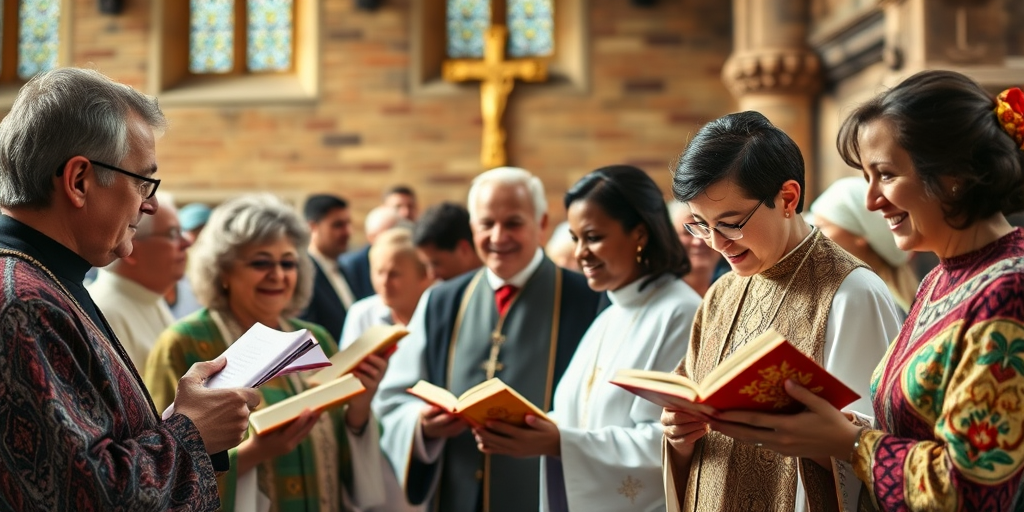England’s WeBelieve Festival to Celebrate Beauty and Diversity of the Catholic Church
In a ground-breaking initiative, the WeBelieve festival is set to take place in Birmingham, UK, from July 25–28, 2025. This new Catholic gathering aims to unite various expressions of the Catholic Church, bringing them under one cohesive celebration that showcases the church’s vast and diverse tapestry. Spearheaded by Monsignor John Armitage of the Guild of Our Lady of Ransom, the event promises to foster ecclesiastical unity and shape cultural understanding within the Church, highlighting a critical need for inclusion and celebration of diversity.
Unity in Diversity: The Festival’s Vision and Scope
Unlike other conferences that often cater to specific movements or expressions, WeBelieve seeks to embrace a broader view of Catholicism, championing the universal nature of the church. Monsignor Armitage underscores the importance of such an initiative, noting, “We’re not traditional, we’re not conservative, we’re not liberal. They’re political terms. We’re Catholic, which means it’s universal.” This perspective shifts the focus to the doctrine and inclusive celebration of faith, resisting the polarizing political labels that can hinder unity.
A considerable highlight of the festival includes liturgies enriched by various musical styles, from modern worship to Renaissance polyphony, and an offering of multiple Roman rites, including the Traditional Latin Mass, Ukrainian, and Syro-Malabar. This eclectic mix not only appeals to a wide range of participants but also symbolizes the congregation’s commitment to diversity within unity.
Prominent speakers such as Archbishop John Wilson of Southwark and Dr. Gianna Emanuela Molla, daughter of St. Gianna Beretta Molla, will contribute to the event, sharing insights that resonate with both the faithful and those exploring Catholicism. Over 100 Catholic organizations have committed to participating, and 600 tickets have been sold already, with the festival boasting the capacity to host up to 3,000 attendees.
Local Impact: Engaging a New Generation
The festival comes at a time of increasing interest in Catholicism among younger generations across Europe, notably among Generation Z. This demographic shift suggests a resurgence of faith in traditional practices, potentially filling the void left by the Church of England’s more progressive stance over the past few decades. Monsignor Armitage posits that adherence to Catholic doctrine offers a sense of truth and freedom that resonates with young adults seeking spiritual grounding. As he aptly notes, “The [Catholic] Church teaches the truth, and that’s why so many people feel that they can find true freedom.”
For the Catholic community, and particularly for young adults in England, the WeBelieve festival represents more than just a coming together of faith expressions—it marks a transformative moment that could redefine religious engagement in the country. This initiative seeks to connect with historical traditions while addressing contemporary spiritual needs, making Catholic life relevant and inclusive for varied audiences.
Context and Historical Significance
The timing of the WeBelieve festival is also significant as it coincides with the 1,700th anniversary of the Nicene Creed and the 175th anniversary of the Catholic hierarchy’s restoration in England and Wales. These anniversaries add a deeper layer of historical resonance to the event, tying current faith practices to a rich legacy of tradition and evolution within the church.
Moreover, in the context of England’s religious landscape, the WeBelieve festival marks a pivotal moment, potentially expanding beyond its initial scope to become an annual event rotating through different regions. Such an expansion could continually engage and integrate various Catholic communities across the UK, promoting a sustained dialogue on faith and cultural expression.
Future Implications and Navigating Challenges
While the festival aspires to foster unity across diverse Catholic expressions, organizers must also navigate potential challenges that accompany such an ambitious initiative. Encouraging participation from all sectors of the Catholic community and maintaining a balance between tradition and modernity will be fundamental to its success. Moreover, consideration of community feedback and ongoing dialogue with participants will be crucial in refining future iterations of the festival.
Ultimately, the WeBelieve festival stands as a beacon of hope and unity, presenting an opportunity to strengthen communal bonds through shared faith experiences. As it unfolds, this initiative could serve as a model for other religious communities seeking to balance doctrinal adherence with modern inclusivity, reinforcing the local impact and community interest in Catholicism and beyond.
Residents interested in participating or seeking more information can reach out to local organizers through the event’s official channels, ensuring that this celebration of faith remains accessible and inclusive for all. As Monsignor Armitage emphasizes, it’s about Jesus Christ—unconditional and universal—and if the church remains true to this, “everything is going to be fine.”







